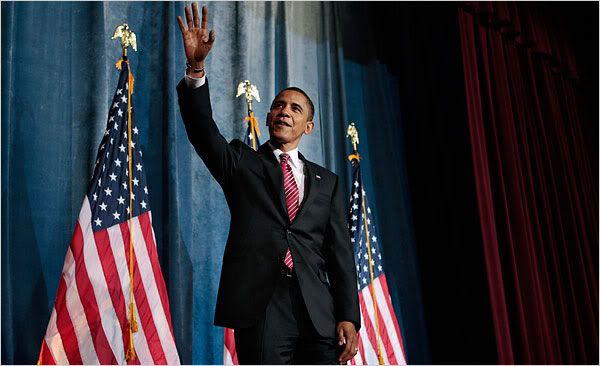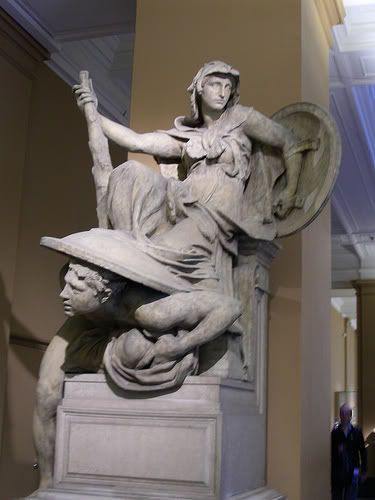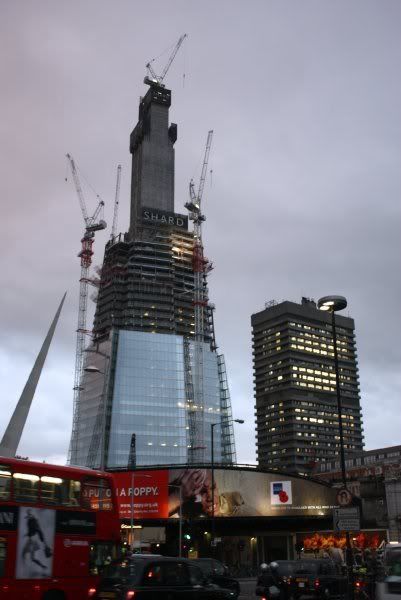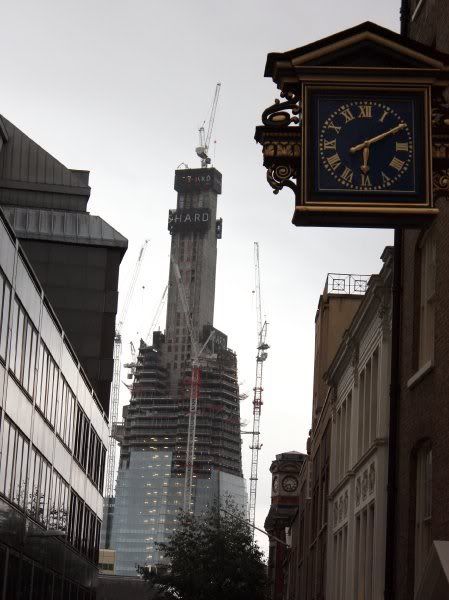Brandon Smith at his site
Alt-Market.com is more optimistic than much of the financial commentariat. He believes there is hope for recovery -- but only on a local basis, and that economies controlled to one degree or another by central government, which is to say yours, mine, and theirs, are cooked.
"Decentralization Is the Only Plausible Economic Solution Left," he titles his latest posting. (Tip o' the hat to
Zero Hedge.)
I've sung a few arias on a similar theme in Reflecting Light, although more about politics than economics. Our federal government, like most of the developed world's national governments, is a lumbering dinosaur with a tiny brain.
Smith -- whose site carries ads such as one for the "Asset Preservation Institute: Preparing Americans for the transformation of America, the collapse of the currency and a prolonged hyperinflationary depression" -- says:
The great lie that drives the fiat global financial locomotive forward is the assumption that there is no other way of doing things. Many in America believe that the U.S. dollar (a paper time-bomb ready to explode) is the only currency we have at our disposal. Many believe that the corporate trickle down dynamic is the only practical method for creating jobs. Numerous others have adopted the notion that global interdependency is a natural extension of “progress”, and that anyone who dares to contradict this fallacy is an “isolationist” or “extremist”. Much of our culture has been conditioned to support and defend centralization as necessary and inevitable primarily because they have never lived under any other system. Globalism has not made the world smaller; it has made our minds smaller.
Good points. Most people today have had no experience of life other than in a country where the government decides what kind of light bulbs may be sold. Since emerging from the womb they have been bombarded with globalist propaganda and told that looking out for their own country is outmoded know-nothingism. And continuation bias is part of human nature: we all expect that the future will be like the present but at a louder volume.
With the latest S&P downgrade of multiple EU nations, including France, Italy, Austria, and Spain, there can be no doubt that interdependency has led to ruin. Despite French president Nicholas Sarkozy’s insistence that the S&P downgrade “changes nothing”, the fact is, the EU has just been dealt a death blow. ...
While some may applaud the fall of the EU as a victory, I would recommend looking a few moves ahead of the game to see where we are really headed. Yes, the EU is a perfect example of the feebleness of centralization, but it is also an expendable piece on the grand globalist chess board, just like the U.S. dollar. Already, IMF mascots like Christine Lagarde and MSM pundits have begun suggesting that the EU is failing not because of centralization, but because the union is not centralized ENOUGH!
Yes, a showdown is looming. Rather than admit that their fantasy of a one-size-fits-all European currency has gone pear-shaped, The Powers will insist that everything will be well if only those fractious former countries quit insisting on setting their own economic policies. Hand over the controls to Brussels/Washington and the joys of an economy managed by the superbrains will be yours forever.
As we have discussed many times over the years, the subversive and sometimes subtle debasement of the dollar is in fact a deliberate program designed by international financiers to force the American public to accept loss of sovereignty and centralize economic authority into the hands of an elite few. The situation in Europe is no different in this regard. Both cultures are being strong-armed through the removal of options and funneled into a waiting net like so much oblivious trout. So, the question must be asked; how do we fight back?
Smith's answer:
The essentials of an independent life are food, water, shelter, property, trade, and safety. The means to attain these essentials have been relegated to instruments which central banks and other elitist entities administer and control. However, that control is and always has been an illusion, an illusion we could walk away from anytime we wish. This is done through localizing the production of essentials. Changing the way we look at trade is the key. A few simple rules, if followed in a determined fashion, make this change a reality ...
His rules may be simple. Implementing them seems to me anything but simple. To wit:
1) Provide Essentials For Yourself Whenever Possible: Some essentials can be covered even when you are alone. If you have access to property, can grow your own food, and have water collection capability, then you are far ahead of the average American in many respects. With modern technology, including space and energy saving methods, self sustainability is possible even in urban surroundings. The goal here is to do for yourself whatever you can, whenever you can, making you less vulnerable to mainstream economic chaos. The more insulated you are, the better equipped you will be to help build or participate in an alternative market.
This "grow your own" lark has been popular in certain circles since the late 1960s, when as a volunteer at the Berkeley Ecology Center I tried hard not to twitch while listening to home-canning bores. Sorry, I just can't see more than a tiny fraction of Americans growing vichysoise in window boxes or raising chickens that roam freely under the bed. But why does the federal government need to have anything to do with food distribution?
2) Network Or Die: Some essentials cannot be provided by one’s self. Organization and networking in order to construct mutually beneficial trade groups is not only necessary, but inevitable in the face of economic collapse. One way or another, every American who wishes to survive will one day have to get up off their couches, leave their houses, and begin working with other people. Either they will see the wisdom in preempting collapse and start networking now, or, they will start networking after collapse out of desperation. Better to start now, and save ourselves the heartache…
Working with other people is a fine idea, and before our political-corporate Politburo started its campaign to de-Americanize America through mass immigration, it might have been feasible. In today's balkanized America, how can anyone "network" with people who press 6 for Urdu on the phone menu?
3) Trade Skills, Not Dollars: Use paper currency while it still has some value, but simultaneously, wean yourself off of it through barter of goods and services. See how many essentials you can fully provide without the use of dollars and without purchases through corporate chains. Think of this as going financially “off-grid”. What systems do you depend on that ultimately harm you? How many of those systems can you decouple from now? Private trade makes independent living attainable by localizing your means of procurement to your own two hands, instead of to a paycheck doled out by a corporation.
Look, the counterculture of the '60s tried this -- it was an article of faith in Berkeley -- but the results were not what the innocents dreamed of. One fine day it was discovered, alas, that the guy who could make your car run again after it went into a coma didn't fancy trading his labor for the turnips you grew in your urban backyard Eden. Of course some individuals can do off-the-books swapping, but what works for certain people in particular situations can't be scaled to a whole economy.
4) Use Commodities, Dump Dollars: Precious metals are the only practical currency exchange available for broad use in a decentralized market. Fiat coupons, digital currencies, sticks and shells, etc., will not work. The inherent rarity of PM’s, combined with their tangibility, and inability to be artificially reproduced, makes them the ideal currency alternative to fiat. Digital currencies, reliant on an internet which may not exist in the manner we know it today, are a tremendous waste of time. Any trade dependent on a system outside of local control is not free trade. Metals place true free trade, at a local level, within reach. Even in a highly developed barter market, currency will play an important role, and PM’s should not be discounted.
Practical currency exchange? There is lots of talk about hoarding gold for the real bad times -- presumably the Asset Protection Institute (see above) would prescribe just that. I've written postings about gold, and think it's not a bad idea to own some if you can -- but as an investment or means of retaining value. It makes no sense to me as a direct medium of exchange, rather than backing for paper currency. Are you going to carry a doubloon to Safeway (if you are so retrograde as not to grow all your own sustenance) and hand it to the checkout clerk, who will slice it using the cash register's buzz saw attachment and hand you a wodge of gold back in change?
5) Become Your Own Industry ... That's fine, if you're the entrepreneurial type. But not everyone is. Very few have what it takes to create a business on their own; I certainly don't. Smith casually overlooks the fact that people vary in their intelligence, temperament, talents and other traits. He apparently believes in human bio-identicalness, otherwise known as the blank slate. He is mistaken.
6) Internalize State Commerce: When enough citizens within each state finally wake up to the dangers of municipal default, federal encroachment on state lands and resources, and the weakness of interdependency on federal subsidies, they will begin to look for ways to plug the fiscal leaks they have ignored for so long. Decentralization truly finds its home within the structure of the states, and the powers afforded them through the 10th Amendment. At bottom, states have the ability legally as well as economically to become the ultimate decentralized systems, being that they are Constitutionally mandated to take such measures anyway. Resource rich states will likely be the first to undertake decentralization in the midst of economic collapse. Oil, minerals, farm capacity, timber, coal, etc, should be the solid ground upon which states and their citizens set foundation, and states should utilize these resources with the intent to enrich their citizens FIRST, through increased employment and local independent business incentives. This would be a far cry from the corporate pirate ship plundering that goes on in states today, and far more financially sound.
Well said. That's one you can take to heart.
Smith concludes, "The path is clear; we decentralize, we localize, and we do it now, or, we lose our country, our cultural identity, and our legacy." If we haven't lost them already.











